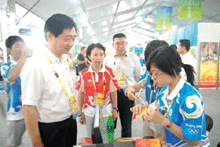They are known as the “bird’s nest generation”, products of China’s one-child policy who are used to living comfortable lives as the centre of attention in their families. But for the many students who were among the 1.7 million volunteers oiling the wheels at last summer’s Beijing Olympics, a transformation has occurred. Never before has the Olympic Games had such an influence on a country’s students; it has become a cherished experience for those who volunteered to help out backstage.
 Most of those who volunteered were born in the late 1980s and early 1990s. They had been the focal point of their extended families and were living comfortably on university campuses, which contributed to the perception that many had lived overly sheltered lives. But the process of volunteering has turned them from a group of often spoilt youths to a strong force of passion and commitment: the most dynamic force of the Beijing Olympics 2008.
Most of those who volunteered were born in the late 1980s and early 1990s. They had been the focal point of their extended families and were living comfortably on university campuses, which contributed to the perception that many had lived overly sheltered lives. But the process of volunteering has turned them from a group of often spoilt youths to a strong force of passion and commitment: the most dynamic force of the Beijing Olympics 2008.
Pei, for example, was a volunteer in the Water Cube, the aquatics centre where the swimming and diving events were held. “It was not simply a case of offering to work; the opportunity to volunteer was hard won through several rounds of fierce competition and review. Usually only one in every ten or more applicants was selected. Once we had got through, we were given rich training, taking in the culture and history of the Olympics and of Beijing, covering various sports and the media industry, learning foreign languages and the etiquette of different cultures,” says Pei.
The training was even more difficult for specialist volunteers such as Pan, a media volunteer at the International Broadcast Centre. “We took five special courses in my university over two years to get ready for the Olympics. I’ve learnt a lot from volunteering, and that even waiting can be an important responsibility. We also learnt to perform simple and small tasks to perfection,” says Pan.
Another volunteer, Feng, was among the 150 students from one top university in Beijing who provided room service at the Beijing Athletes Village. “Trivial though my work was, I felt so fulfilled,” he says. “I like to work in a team, learning from each other and doing my bit — it is both giving and receiving.” It is telling that the slogan favoured by student volunteers was not the official one, “A volunteer’s smile is Beijing’s best image”, but the more straightforward: “I volunteer, I feel good.”
The Beijing Olympics were a spectacular success both at home and abroad, but among the highlights was the growth of the volunteer spirit, which has undoubtedly spread wider and further than the games themselves.
(Excerpted and adapted from Times Higher Education Supplement)